This List of the 10 Most Unpopular Senators Started a Conversation About Sexism

By:
A recent survey assessing the popularity of U.S. Senators has inspired a new dialogue about sexism in politics. Conducted by Morning Consult, a digital media and survey research company, the survey asked 85,000 voters from January 2017 to March 2017 to say whether they strongly approved, somewhat approved, somewhat disapproved, or strongly disapproved of each of their two senators. They could also say they had "no opinion." Morning Consult released the results on Tuesday, which offered rankings of the senators with the "highest approval" and "highest disapproval" ratings.
Vermont's Independent Sen. Bernie Sanders, a former 2016 Democratic presidential candidate, had the highest approval rating at 75 percent with a 21 percent disapproval rating. Republican Senate Majority Leader Mitch McConnell from Kentucky had the highest disapproval rating at 47 percent.
Though Sanders garnered the highest approval ratings, another New England senator with progressive leanings, Massachusetts Democrat Elizabeth Warren, landed high on the disapproval list.
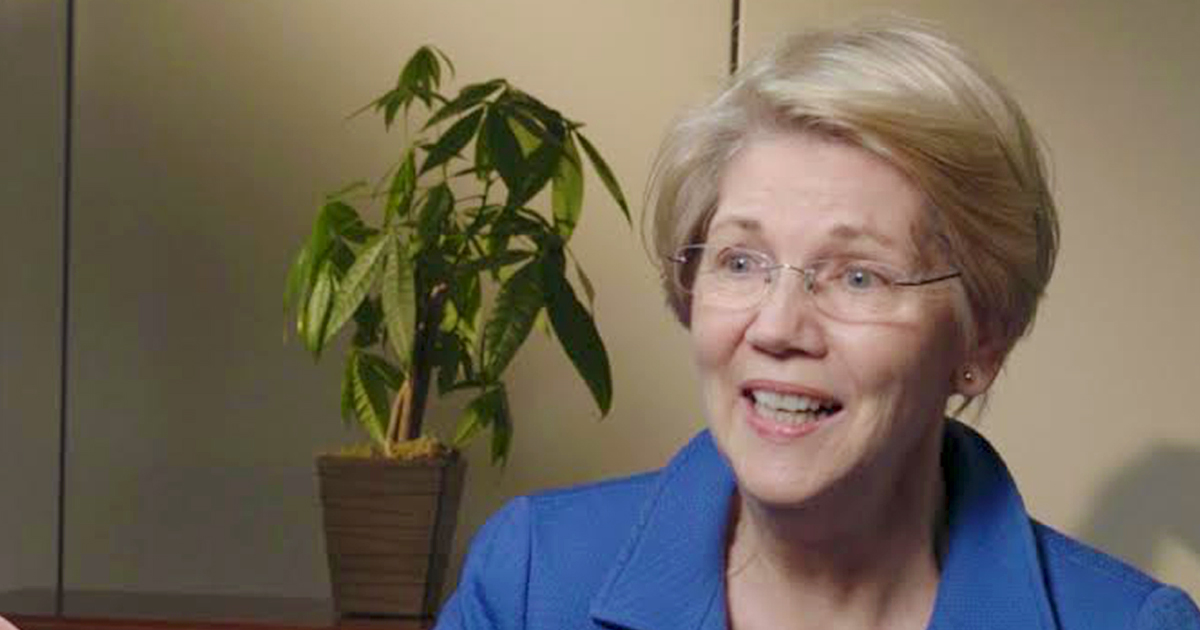 attn.com
attn.com
As Boston Magazine pointed out, Warren landed with the ninth highest disapproval ranking, although there were ties for the sixth and seventh spots, meaning there are actually 13 senators in the top 10. As you can see in the Morning Consult chart below, Warren had a 38 percent disapproval rating and a 56 percent approval rating.
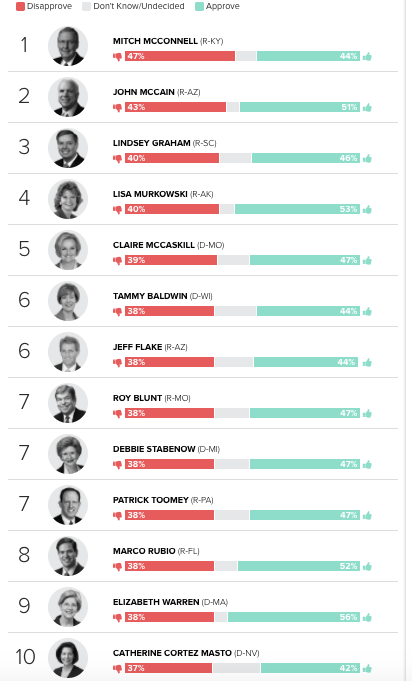 Morning Consult - morningconsult.com
Morning Consult - morningconsult.com
News of the results started debates about Warrens' popularity with her constituents.
 Facebook/Marty Lamb - facebook.com
Facebook/Marty Lamb - facebook.com
Some Facebook users reacted to the news by bashing Warren, some even calling her a "nut case."
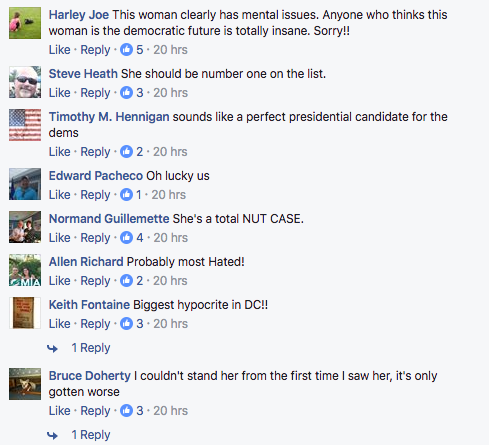 Facebook/ "Elizabeth Warren is Batshit Crazy" (Group) - facebook.com
Facebook/ "Elizabeth Warren is Batshit Crazy" (Group) - facebook.com
One Twitter user called Warren a "yapping chiwawa [sic]," likely referencing the shrill barking of the Chihuahua breed of dog. The Twitter user also invoked the #BernieorBust hashtag that was popular during the 2016 presidential election.
Discrimination against women, even in subtle forms, is common in the workplace, so it's logical to see how it could this phenomenon could translate into the political world. Throughout the 2016 campaign, Democratic presidential nominee Hillary Clinton was criticized for her tone of voice and her facial expressions.
Although Sanders and Warren share similar positions on key issues like student loans and Wall Street regulations, their popularity ratings in the survey were vastly different.
Could the differences in Sanders' and Warren's popularity be attributed to sexism?
ATTN: talked to two millennial voters who had weighed in on the matter on Facebook.
Lean Cornish, 29, lives in New York City, and works in advertising.
 Facebook/Danielle DeCourcey - facebook.com
Facebook/Danielle DeCourcey - facebook.com
She told ATTN: via email that it's definitely possible for people to prefer Sanders' polices over Warren, but the significant differences in approval ratings could mostly be attributed to sexism.
"They talk about a lot of the same issues and rail just as loudly as one another, but he’s seen as a cute old Larry David clone and she’s a harpy," she said. She noted that Warren received backlash from some liberals for backing Clinton instead of Sanders in the presidential election.
"People were mad at her for supporting Hillary over Bernie," said Cornish. "Bernie may have been the more progressive candidate, but Hillary had the best shot."
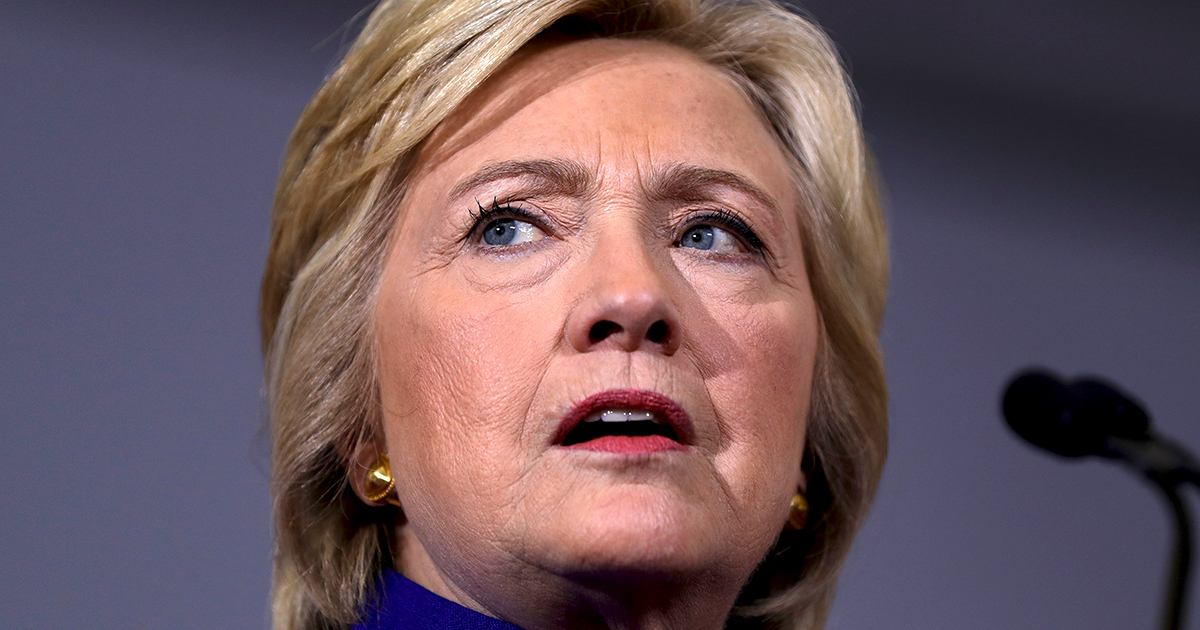 AP/Matt Rourke - apimages.com
AP/Matt Rourke - apimages.com
Cornish said it can be difficult for men to see how sexism is intertwined with politics.
"Sexism is the primary role at play here and anyone who says otherwise is not paying attention, or, more likely, is a man," she said. "Elizabeth Warren is constantly called 'shrill'. She’s 'aggressive.' She’s a 'bitch.' She needs to 'tone it down.' All of these are terms that are used specifically to talk about women in power."
Alex Jasset is 30-years old and works with non-profits in Boston.
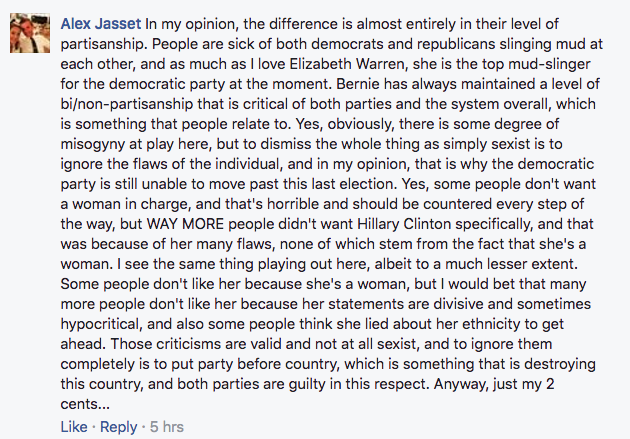 Facebook/Danielle DeCourcey - facebook.com
Facebook/Danielle DeCourcey - facebook.com
He said that "of course" sexism is present in politics, but he believes Warren is less popular than Sanders because of differences in their politics.
"People are sick of both Democrats and Republicans slinging mud at each other, and as much as I support Elizabeth Warren's policy goals, she is the top mud-slinger for the Democratic Party at the moment," he told ATTN: via email. "Sen. Sanders has always maintained a level of bi- or non-partisanship that is critical of both parties and the system overall, which is something that people relate to."
Jasset said that the Warren's ties to the Democratic Party establishment have hurt her popularity.
"After this last election, people are really tired of the partisanship, and Senator Warren's constant defense of the Democratic party and attacks on the Republican Party are a reminder of which side she's on," he said. "For most independents, and many people on both sides, putting party differences front and center is getting old. People want new ideas that move beyond traditional party differences."
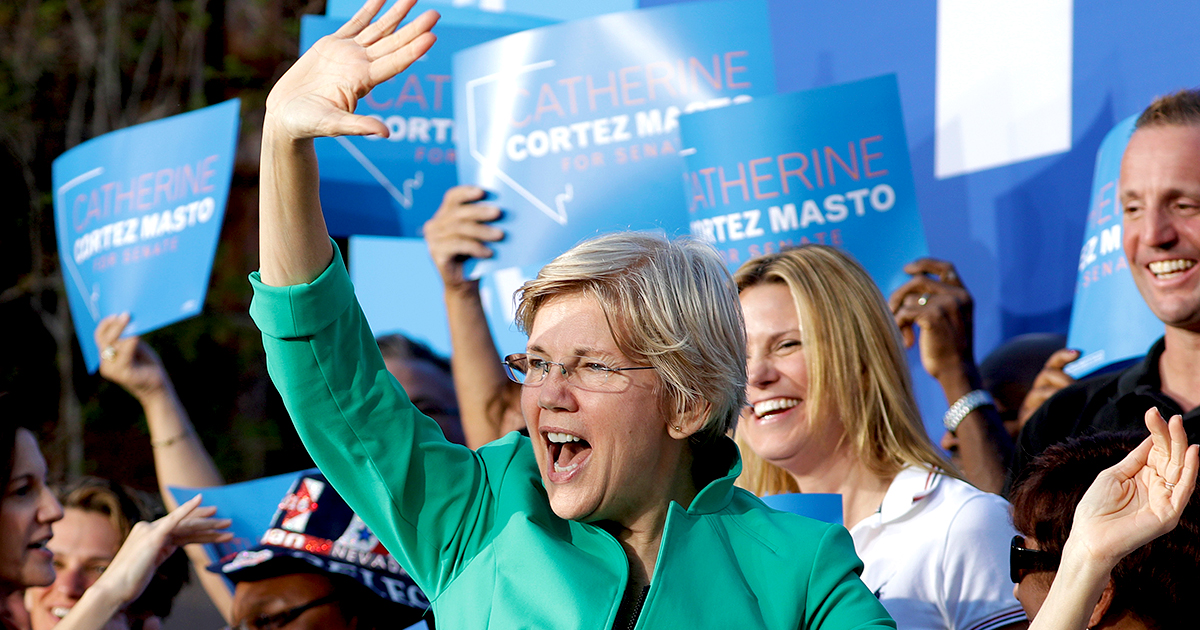 AP/John Locher - apimages.com
AP/John Locher - apimages.com
Jasset said that sexism is a "huge problem" that should be addressed but that dismissing every criticism of women politicians as sexist does a disservice to important conversations.
"I've heard very sexist comments from people, including women, in familial and social settings about Sen. Warren," he said. "However, I think the media often oversimplifies the situation by chalking it all up to sexism, and I think that the last election proved that it's unwise to ignore the legitimate criticisms of candidates, even when legitimate questions of sexism are also present."
